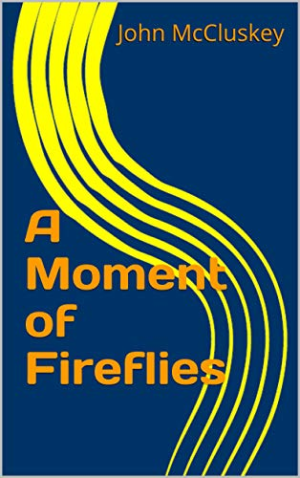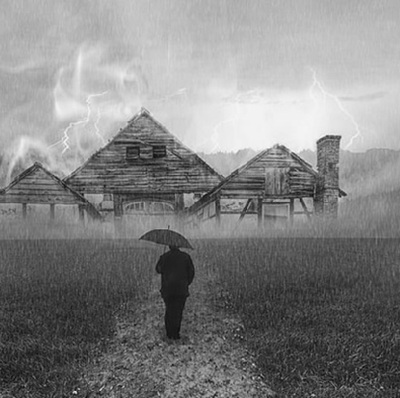.
.
John McCluskey’s novella A Moment of Fireflies (New Plains Press), tells the story of Michael Callahan, a Depression era alcoholic husband and father, wrestling with a tormented past and its impact on him and his family, especially his young son David and younger daughter Meggy.
While the novel itself is not specific to jazz, there are sections, including this excerpt, where a character falls into a dreamlike stream of consciousness almost poetic trance, similar to the free form expressions jazz musicians typically employ.
This particular segment deals with Michael’s inability to control his rage after a long drinking bout and subsequent run-in with a tramp in the alley on the way home. Upon his arrival at home late that night, he finds his young son at home, his son reminding him of how he was at the same young age of ten years old when he himself encountered a traumatic event.
.
.
.
An excerpt from the novella A Moment of Fireflies
by
John McCluskey
.
Michael continued down the darkening street. A gust of wind blew off the Lake. His eyes watered. He turned his back to the wind, and the wind blew hard, unfurling his coat and his pant legs. He bent into it to soften its assault, but he soon turned his back to protect his face against the onslaught. A man and a woman hurried across the street, almost bumping into him, holding hands as if one would fly away. The lid blew off of a trashcan and crashed wildly into the street; a car rattled by up ahead at the intersection. When at last the street was empty with no more cars and no more men or women about, Michael found himself alone but for a few tossed snowflakes, though nothing would become of the snow. He reached again for his empty flask, and the wind blew grit into his eyes. He cursed the street and the wind, and he rushed his hands to his eyes to work the grit out when a full page of the Tribune flew wildly by and caught itself on his pant leg and stuck there: a panicky white flag with news of more jobs lost.
“Why can’t Meggy be healthy!” Michael said aloud to the night. He reached for a cigarette then cried out in frustration and anger when he remembered he had none. Needing another drink, and with time still on his hands, he looked down the street for a bar. A distant light caught his eye; he staggered towards it and indeed it was an open tavern. He shouldered his way in, bumping and tripping over the men, and he paid for his whiskey, and he drank it hard and fast, and he paid for the other men at the bar, whom he did not know, and they nodded, and Michael took more whiskey and tried to slow down, but the idea of Meggy going into the neighbor girl’s house would not leave him, nor succumb to the whiskey. He coughed and threw down his money. He took another shot and tripped on his way out, but he caught himself before falling out of the door and back into the cold street. He hated the girl’s father for getting TB and passing it onto his daughter, then his own, and even though the wind had settled for a moment, it was not yet done, and it blew in haphazard gusts before falling off to a low moan. How angry Michael was at the girl, at her father, at the house and the pain, and another house and a wild Irish sea, so long ago, and horses running in the back yard, and why did he go in that house? Why would a ten-year old boy do such a foolish thing – why do children go into houses that leave such an everlasting pain? How Michael hated the little boy who went into the house, and followed the farmer, and didn’t have enough sense to turn around. “Turn Around!” he yelled. He stopped in the middle of the street, deciding instead to cut through the alley; he waved his arms as if calling someone to come over quickly. “It’s all your fault! Why didn’t you turn around?” Michael cried out into the purpling sky, and he swung wildly at the air. “I’ll show you not to turn around. Get back over here! I’ll teach you a lesson you’ll never forget!” he yelled, and the wind quieted for a moment, and only Michael’s words rode the last of the day’s light down the alley, as he came upon a lost soul raising a bottle and drinking in great gulps, his sunken blue eyes reflecting a fear of what had just been lost and what was never to be found again.
“Oh, the unfinished is glorious and shattering!” the drunk said to no one.
He then raised the bottle to the sky.
“The floor of Purgatory lies littered with the shards of our luster!“
He brought the bottle to his mouth and took a long pull. A few flurries tripped and floated down from the sky.
Michael watched, stunned by the man’s presence, though the sudden distraction tamped down his personal fire only momentarily. He thought how easy it would be to take the bottle; he could steal it effortlessly. The man, looking so disheveled, cold, and unsteady, would put up no fight, but Michael was not a thief. The man looked up at Michael. The look in his eyes did not fit the unshaven face and sallow skin, and he held the bottle out, and Michael took the bottle from the man’s offering hands, and he raised it high and took a healthy gulp. When he took the bottle from his lips, he saw the man looking up at him intently, as if he had known Michael a long time. His rough and hard hands had dipped into the fresh snow, and he let the virgin powder from the sky slip slowly and menacingly through his dirty rough fingers.
“Though your sins be as scarlet, they shall be as white as snow,” the man mumbled. Michael dropped the bottle.
“You think I’m a bum, a drunk, I can see it in you!” the man said, looking directly at Michael.
Michael was thoroughly taken aback by the outburst and the image of the man’s hands.
“If I’m such a drunk, how come I’m sitting here reciting the Good Book, and my very own poetry, that’s right – mine! and you’re drinking my whiskey! I go to the library. Where do you go−an alley with a drunk!” The man cackled. Michael turned from the man.
“Walk away!” the man called out. “ I’m a sight aren’t I? But The Almighty lives in all of us, even a wretch like me!” The drunk continued to recite, his words slurring into a convoluted drone.
“When you shatter: weep! Practice first with glory, let your tears drop like sparrows….” Then he turned his attention to the mouth of the bottle. “I suppose there’s a bit of The Almighty in here,” he muttered, “and a bit of the devil, to be sure!”
He fell back against a garage door, laughing and spilling into the alley.
Michael burned with the red embers of the deepest level of self-loathing as he headed down the alley towards home, and the wind found its gusty breath again, and it blew as hard as ever.
* * *
The boy at the kitchen table with a cup of tea and his schoolwork on a cold winter night. His mother at the kitchen sink. The silence in the house and the buzz of the kitchen light bulb. The sleeping little girl with a cough in the back bedroom. The wind against the window, and the fingers of cold air slipping in under the back door.
The sudden rattle of the front room doorknob. The mother’s eyes. “Get your jacket and go outside!” The spilled tea spreading over schoolwork. The boy up at once and the search for a jacket. The lamp crashing to the front room floor. The trembling and retreating to the back of the house. The wind against the windows. The heavy coughing in the front room and the creaking floor of approach. The wild eyes. “Don’t you ever, ever go into that house!” The aimless swinging arms. The self hatred. “I told you to turn around!” The slurring of words. The trembling, and the buzz of the light bulb. The mother, in tears. The grabbing of the young boy’s arm. “No, Pop!” The tripping over the kitchen chair while holding his boy’s arm. The mother in tears. The young boy, and the tight grip of the father’s hard hand on his boy’s arm. His son’s arm; his own. “Pop, please!” The heavy whiskey’d breath, the determination to change the past. The cursing; the flinching; the father’s wayward hand across the boy’s mouth, meant to break the fall of a stumbling father and son crashing over the kitchen table to the floor. The broken table. The tender face, the faint taste of blood in the mouth.
The stopping of time. The boy’s disengagement.
The early evening of summer and the last of the day’s warm wind thin and whispered on Keeler Avenue.
The remembering, the distant image, the pining for a return of father and son.
The last of the day’s men drifting off the street, coats folded over forearms, collars pulled back to the warm wind, and the street swept clean, and the green leaves overhead, and the distant rumble of a single car passing away, and the calls of a distant child and a late jay overhead, then the sounds of nothing in the air, and the boy and his father sitting on the front porch steps in the tender beginnings of civil dusk.
The deep place inside of him reached.
The father and the smoke from his cigarette, easy into the amaranthine beauty of the dying sky. The boy, one step down, and the tap-tap-tap of a discovered stick against the cement steps alongside his father. The cement porch, cool to the touch, and the father’s wordless look into the heavy air straight ahead; the boy’s silent place on the steps next to his father in the gloaming.
A stick and the lazy tap tap tap. The smoke; no words; the peaceful heart, and the waiting for nothing at all. A nail clipping of moon in the last ash of sky overhead. An open window behind them. The early dew on the front paws of an evening cat.
The last of smoke expelled and the tossed cigarette. The standing, the stretching, the deep breath. The gold pocket watch in the palm of a working man’s hand. The marking of slow time granted father and son, disclosed to the evening in the sorrow of a distant child, and a boy looks up and drops his stick, and a father says “Let’s go” and the boy leaps up, and a walk in the silent darkening evening of now.
.
.
_____
.
.
Excerpted from
by
John McCluskey
.
_____
.
















































